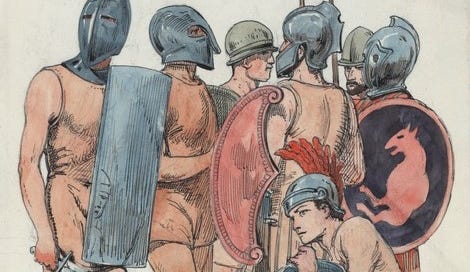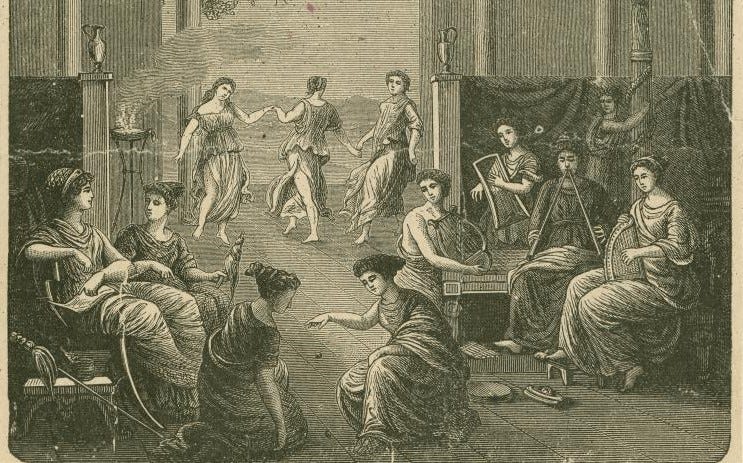Why Roman History Brings All the Boys to the Yard
(or How Feminist Classicism Changed the Study of History)
After a recent social media buzz that “prompted women to ask the men in their lives how often they think about ancient Rome,”[1] I felt rather compelled to pen this. I mean, mostly out of irritation. Maybe it’s the former college history instructor in me or maybe it’s because I’ve had to listen to one too many mansplainations on Roman battle tactics that compelled me here to complain… but also to enlighten (at least I hope so).
First, let me disclose that I, a woman, think about the Roman Republic and Empire quite frequently but not once have I done so with my genitalia. (Not putting down anyone who uses their privates for such things, knock yourself out.)
Look, the ancient Romans are endlessly fascinating. But they were also endlessly misogynistic, and I suspect some of those modern men who profess a preoccupation with the history may not be entirely aware of what may be enticing to them. (Yes, yes, not all men.) Focusing on ideas of centurions, battles, and masculine bravado in a world where only men rule… well it certainly becomes ever so easy to digest as a simplistic fantasy.
I challenge that it’s not specifically Roman history that brings all the boys to the yard. But military history. Ancient Romans, U.S. Civil War, and World War II military history is filled with armchair historian fanboys. It’s not that any of this is bad. I can’t criticize at all because I too like military history and I especially enjoy the strategies and tactics of ancient battlefields. I think often about the effectiveness and weaknesses of phalanx formations or the important use of the maniple (which does not refer to man nipples which may come as a surprise to some) at the Battle of Cynoscephalae.
I hold degrees in history, including an MA in Ancient and Classical History. Hell, I’ve even served in two different military branches. But even with all this, I’ve taught many male students (of various ages) who seemed bent on spending every class attempting to teach me military history. Why? Well, that blasted genitalia again. (Who knew the degrees couldn’t compare to a phallus. Is there extra knowledge storage in there or something I don’t know about?)
But here’s the real reason: men have owned the field of history for a long time. Because of this, they’ve established and owned the narrative, one rooted in perceived ideas of maleness. Now, the subject matter studied isn’t all negative. There is something heartbreaking and moving to hear the stories of Civil War soldiers giving their life for a fellow soldier on the battlefield. There’s something deeply beautiful and bittersweet to hear stories about the grit and sacrifice of WW2 troops during the Battle of the Ardennes. Military history is important for both historical study and for the human spirit. These stories can inspire us, drive us to be better, to emulate noble acts.
But it is important to point out these stories do not belong only to men. Further, military history often centers the male experiences as central and ignores all else. But… yes, I know this may shock some… there were ancient Romans who not men *gasp* and yes, hold on to your seats… also people who were not men involved in the Civil War and WW2.
The study of history, true understanding of it cannot be fully realized without studying the flip side. The vital moment a soldier froze in fear or acts of senseless violence. It also cannot be fully realized through military history alone or just the history of rulers and generals. Military history only tells us a small sliver of what things were like in the past. It ignores day-to-day life, family units, agriculture, skilled craftsmen, burial customs, gender identity, priests/priestesses, and what women were doing at that time. It ignores the mundane and socially messy things in favor of easy to accept statistics and accounts. It allows for the glorification of war and stories filled with men to admire.
But it is missing the rest of the human experience.
In the 1970s the Feminist Classicist[2] movement gained traction in the field of classical history. (One of the few amazing things the 70s gave us. It's hard to soil to grow in among the pea green wall-to-wall carpets and serial killers imho.) Feminist Classicists wanted to find out what the past looked like outside of military history and elite classes. They very specifically wanted to know what women were doing and how did people who were not elite lived. It is their work that really gave us a solid understanding of the classical world including Rome. They were willing to do the work to dig into the complicated mess of human existence at various points in history, to uncover and analyze information that didn’t result in a winning or losing side.
So again, let me restate: it's not only ancient Rome men are thinking about in this social media exercise, it's military history. However, military history does not belong to only men, no more than Roman history does. If you're a man (or any gender identity) who loves military history, there's not a thing wrong with that but be sure to investigate beyond it. Of course, if you do, be ready to hear about gender fluidity, mystery cults and religious castration (pursuing sacred concepts of womanhood), the overwhelming power over life and death held by the paterfamilias, the patron system, slavery, infanticide, nursing mothers and professional wet nurses. Be ready to understand divorce, adoption, prostitution and public bathrooms. All the chaos of day-to-day human life.
It’s all part of history and I promise quite fascinating… and all of it vital in understanding the past.
[1] Leo Sands, “How often do men think about ancient Rome? Quite frequently, it seems.” Washington Post, Sep 14, 2023. https://www.washingtonpost.com/lifestyle/2023/09/14/roman-empire-trend-men-tiktok/
[2] https://medium.com/cloelia-wcc/twenty-five-years-of-feminist-theory-and-the-classics-now-what-487afefe83f8






My partner thinks about Roman warfare approximately every .3 seconds, but he is a wargames analyst for work, so it would be weird if he didn't. He, thankfully, also cares about the history that isn't all war because you can't really understand why they did things the way they did if you don't understand the rest of the context surrounding it.